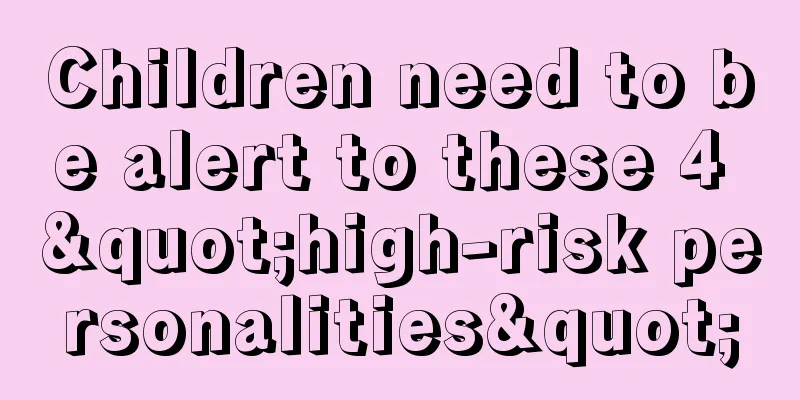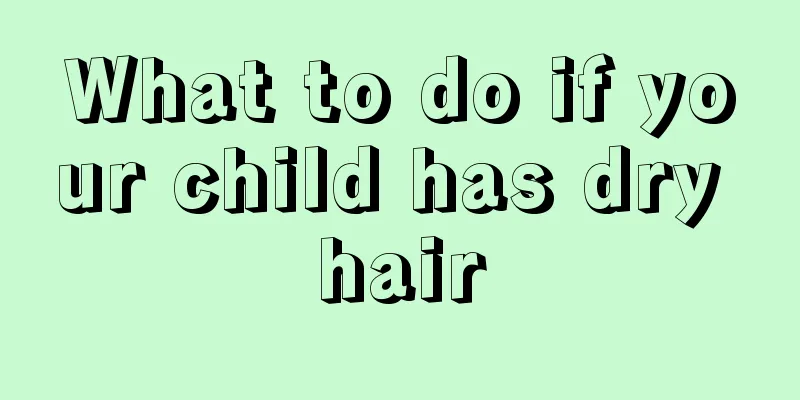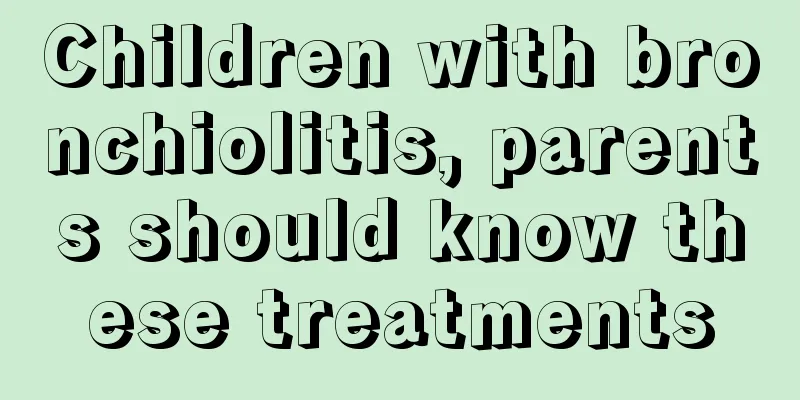Children need to be alert to these 4 "high-risk personalities"

|
3-6 years old is often referred to as the "wet cement" period, which is the most important stage in the formation of a child's character. 85%-90% of a child's character, ideals and lifestyle are formed during this period. As the saying goes, you can tell a person's future at the age of 3 and his old age at the age of 7. Many of a person's personalities can be seen at a very young age. Young parents want their children to be happy, confident and popular. However, these traits will not appear just because of the parents' "hope". In most cases, they require the parents' attention and cultivation. The following signals are reminders for parents to provide help and intervention to their children. One: Shy Many parents of shy children have had this experience: when at home, their children have loud voices, dance and sing, but once a stranger comes, the child seems to become a different person. The most embarrassing situation is that they refuse to say hello to their elders, or if kind uncles and aunts want to tease them, they immediately become curled up hedgehogs. In fact, shy children are not shy all the time. Their shyness is mostly manifested in unfamiliar environments or in front of strangers. We now know that children of all temperaments can become successful. Shy children are usually quiet and follow the rules. But it is undeniable that shy children feel nervous and fearful of unfamiliar environments and things, and their "safe zone" is small, so they adapt slowly and take a long time. Due to the lack of opportunities for public performance, they receive less attention from school and peers. Because they do not like to fight for it, they often lose many opportunities. More importantly, in this fast and fierce competitive era, shy children may also develop an inferiority complex and doubt their self-image... These are all things that parents need to pay attention to. Improvement points: 1. A shy child must first know that he is not so "different". Compared with his peers who are active in public, he just needs more time to get into the state. Just like when building blocks, he can build faster than his active cousin. 2. Although he is willing to play outside, he really doesn't want others to "watch" him. The feeling of being under the "spotlight" only makes him more uncomfortable. 3. He needs to know how to fight for and grasp his rights in certain situations; he also needs to understand the specific methods and techniques of public expression, which cannot be empty talk but need to be detailed and practical. 2. Bad temper A mother described her troubles like this: "My three-year-old child often loses his temper. When he doesn't want to do something, he will lie on the ground and dance around. I don't want to take him out because he often loses his temper. Every time he loses his temper, I try all kinds of methods, such as coaxing, scolding, beating, scolding, and teaching him a lesson. Although I can 'pacify' or 'suppress' him with effort and time, this happens again and again, making me exhausted." Emotional Quotient (EQ) determines 80% of a person's success. The most important component of emotional intelligence is the ability to manage emotions. Emotional control is something that parents need to spend a lot of time and effort to educate their children. For parents who are impatient by nature, teaching their children to manage their emotions is undoubtedly more difficult. It is often the case that one of the parents of a bad-tempered child is likely to have a bad temper. Be aware that children know how to irritate you. If you are a person with a quick temper, it is easy for your child to start a war with you, and both of you will yell at each other and there will be no winner. If you ignore his temper or walk away, you're sending a clear message: temper tantrums are unacceptable. This is also an important part of children learning rules. What parents need to remember is that if a child achieves an unreasonable goal by losing his temper once, he will lose his temper again and use this method again and again. Improvement points: 1. In fact, everyone gets angry, sad, frustrated, and disappointed. The difference is that people with strong emotion management skills will express their emotions in a healthy way. Screaming, rolling on the ground, crying, throwing things, swearing, kicking and hitting are all ways to express bad emotions, but they are not healthy. Overall, you need to clearly communicate that it's okay to be angry, but it's not acceptable to express your anger in a negative, angry, or hurtful way. Therefore, children need to know how to express their inner troubles and depression without rolling on the ground or throwing tantrums. 2. In specialized children's emotional intelligence training institutions, healthy methods of emotional expression are strongly advocated. "Safe venting island", "emotional trash can", "balloon exercise" etc. are widely used. Children know that when they are particularly angry, they can be taken to their own room and vent by hitting pillows and burying their heads in the quilt; they can also draw unhappy things and throw them into the emotional trash can; they can also do "breathing balloon exercises" to calm themselves down and express their ideas in a healthier way. Three: “I can’t” These are the most heartbreaking words a parent can hear from their child. Children who withdraw are frustrating. After all, self-confidence is the most important quality of a person. If a person has no self-confidence, he will never start to do anything. Even if he starts with the encouragement of others, a small difficulty can trip him up, because he has never believed that he can do it. From the perspective of developmental psychology, 3-6 years old is a critical period for protecting children's self-confidence. How self-confidence is established during this period will have a significant impact on elementary school and even adulthood. Distressed parents often try all kinds of praise and encouragement, but the children are still "allergic to frustration" and often say "I can't do it", "I won't go", and "I can't do it". Recently, researchers have discovered that low tolerance for frustration is actually the result of families’ misuse of “appreciative education.” In order to encourage their children, many parents (elderly people) often say "great", "the smartest", "the most powerful", and praise any good performance. However, the information children receive outside is in stark contrast to this. He easily discovered that this was not the case at all! Not only was he not the best, in some aspects, he was far from it. My self-confidence plummeted from then on. Experiential education is often more profound than language education. Too much attention is another reason for low tolerance to frustration. Children who are the center of attention are usually sensitive, afraid of making mistakes, and very concerned about what people around them think of them. They dare not try anything unless they are absolutely sure. Improvement points: 1. Self-confidence is gained from experience. The simplest and most effective way for families to cultivate children's self-confidence is to let children do things on their own within their ability. 2. Most importantly, parents should praise their children’s efforts rather than a certain result at the moment. Don’t say, “You did a good job today,” but instead say, “I want to praise you because you tried hard to control yourself and didn’t run around in class.” Let children know clearly that their parents value the process of their efforts more, which will give them the confidence to face difficulties. In the emotional intelligence training camp, "What Failure Looks Like" and "Give an A+ for Effort" can convey to children important concepts and practical skills about self-confidence. Four: Not sociable Children aged 3-6 are still self-centered. In interpersonal relationships, they do not yet understand the true meaning of friendship. "Good friends" are only based on toys, snacks and other items. However, parents can still see that some children play very harmoniously together and seem to be born "social masters". Most of these children have the following traits: willingness to share, love, willingness to help others, compliance with rules, and initiative. While others are “alternative characters”. Some children easily come into conflict with others; some children constantly "deliberately" "tease" others, causing their peers to dislike them; and some children stay away from the crowd and find it difficult to participate in games. Children at this stage have begun to learn to become a "social person". If they have difficulties in interpersonal relationships, they will definitely need help and support from adults. Common reasons why children are not sociable include: Most commonly, this child behaves in a way that offends others. Like adults, children do not like domineering, self-centered or destructive behavior, and they do not like to play with people who do not follow the rules of the game. Children with attention problems often also have interpersonal problems because they have difficulty understanding the rules of the game and are prone to lose their temper if they don't meet their expectations during the game. In addition, shy children may have problems fitting in and are easily laughed at by others. Conclusion Experts believe that parents must take their children's actions seriously. Parents' upbringing and education methods, as well as changes in the social environment will have a certain impact on a person's personality. It depends on the environment in which the child grows up and the teachers under whom he learns and develops. If parents, teachers and friends in society give correct and sound influences, his future development will be more optimistic, and vice versa. |
<<: Ten basic skills that children must learn
>>: Seven tips to help your child get along better with others
Recommend
Why can't babies eat salt?
Salt is a seasoning we often add when cooking, an...
What is the importance of nutritious breakfast for children?
The pace of life is getting faster and faster now...
Why does my baby not like to eat?
We all know that for parents, the most troublesom...
Children's nutritious meals
The nutritional meals of babies are of concern to...
Symptoms and treatment of cerebral palsy in children
Cerebral palsy is a very common disease, often oc...
What to do if your newborn has a stuffy nose
Many people know that if their nose is blocked, i...
What medicine is effective for children with rhinitis
Rhinitis is an inflammation of the nasal mucosa. ...
How to eat when baby has pharyngeal ulcer
The baby is the apple of the eye and the joy of a...
What should I do if my baby has red stools?
This situation in which babies have red stools du...
What is the cause of constipation in a five-month-old baby?
Today I’m going to talk to you about why a five-m...
Symptoms of calcium deficiency in 9-month-old babies
9-month-old babies are in the toddler stage, and ...
4 suggestions for baby's nutritious diet in summer
1. Food is light and nutritious Keep food as ligh...
What to do if your child has myopia in one eye
More and more people are suffering from myopia in...
At what age is it better to wean a baby boy?
Nowadays, many people born in the 80s and 90s hav...
When can children have their teeth straightened?
Before school age, babies' teeth may have var...









